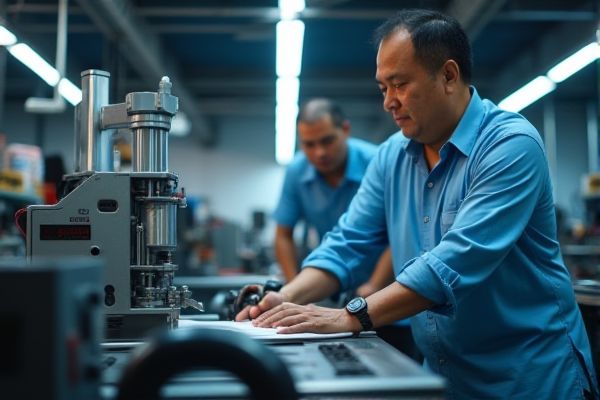
The Philippines offers a range of manufacturing job opportunities across various sectors, including electronics, textiles, and automotive. Major cities like Manila, Cebu, and Davao serve as hubs for multinational corporations, providing positions in production, quality control, and supply chain management. The growing demand for skilled labor has led to initiatives aimed at enhancing technical training and vocational education, ensuring workers are equipped with relevant skills. Companies often seek individuals with a background in engineering or degrees related to manufacturing technology, making technical education crucial for career advancement in this field.
Job Description
Manufacturing jobs in the Philippines encompass a wide range of roles, including assembly line workers, quality control inspectors, and production supervisors. These positions often require a blend of technical skills and attention to detail, as the industry focuses on producing electronics, garments, and food products. Companies in the Philippines frequently provide training programs to enhance employee skills, ensuring they remain competitive in a dynamic market. As a result, opportunities for career advancement and skill development are plentiful within the vibrant manufacturing sector.
Requirement
Manufacturing jobs in the Philippines typically require a high school diploma or relevant technical training, though some positions may need a college degree depending on the role. Employers often seek individuals with experience in specific manufacturing processes or machinery, along with skills in quality control and safety protocols. Proficiency in teamwork and effective communication is essential, as many tasks are performed collaboratively in a production environment. Certifications in areas such as lean manufacturing or Six Sigma can enhance your employability and demonstrate your commitment to industry standards.
Salary and Perks Expected
Manufacturing jobs in the Philippines offer competitive salaries that can vary significantly based on the specific industry, experience level, and location within the country. Entry-level positions typically start at around PHP 15,000 to PHP 20,000 per month, while more experienced workers can earn upwards of PHP 30,000 or more, especially in skilled trades. Employers often provide perks such as health insurance, overtime pay, and transportation allowances, enhancing the overall compensation package. Considering the robust growth of the manufacturing sector in the Philippines, job security and opportunities for advancement are also favorable for workers in this field.
Similar Job Names
- Manufacturing Engineer
- Production Supervisor
- Quality Control Inspector
- Machine Operator
- Assembly Line Worker
- Production Planner
- Warehouse Technician
- Maintenance Technician
- Manufacturing Technician
- Supply Chain Analyst
- Process Engineer
- Operations Manager
- Industrial Engineer
- Materials Handler
- Equipment Operator
- Safety Officer
- CNC Machinist
- Production Manager
- Foreman
- Textile Engineer
Job Expectation Concept
Manufacturing jobs in the Philippines are increasingly pivotal to the economy, reflecting a growing demand for skilled labor and innovative practices. Companies expect employees to possess a combination of technical expertise and soft skills, such as teamwork and problem-solving abilities, to enhance productivity. Your adaptability and willingness to learn new technologies can significantly influence your career trajectory in this dynamic sector. Embracing continuous improvement and staying updated on industry trends will position you well within this competitive landscape.
Career Advantage and Weakness
Manufacturing jobs in the Philippines offer significant career advantages, such as competitive salaries and the potential for skill development in a growing industry. The country's strategic location and access to international markets enhance opportunities for export-driven manufacturing, benefiting both employers and employees. However, these jobs may present weaknesses, including often challenging working conditions and limited job security due to fluctuations in global demand. It's essential for you to weigh these factors when considering a career in the manufacturing sector in the Philippines.
Important Thing Must Know
Manufacturing jobs in the Philippines play a crucial role in the country's economy, contributing significantly to employment and exports. A diverse range of industries, including electronics, textiles, food processing, and automotive, offers various opportunities for skilled and semi-skilled workers. Competitive wages, especially compared to regional neighbors, make these positions attractive for both locals and overseas applicants. The Philippine government supports manufacturing through initiatives that aim to enhance infrastructure, improve worker skills, and promote foreign investments. Understanding the landscape of manufacturing jobs can help you make informed decisions about career opportunities in this vibrant sector.
Alternative Career Options
Manufacturing jobs in the Philippines can lead to various alternative career options, especially as industry needs evolve. You can explore roles in logistics and supply chain management, which are crucial for maintaining efficiency and productivity. Another option is transitioning into quality assurance, ensuring products meet specific standards, thereby enhancing your analytical skills. Pursuing opportunities in technical sales or support can also be appealing, as these roles require strong industry knowledge and interpersonal communication to connect with clients effectively.
Companies List
- JG Summit Holdings
- San Miguel Corporation
- Ayala Corporation
- Universal Robina Corporation
- Monde Nissin Corporation
- Del Monte Philippines
- Nestle Philippines
- Procter & Gamble Philippines
- Coca-Cola Beverages Philippines
- Unilab (United Laboratories)
List of Ideal City
The Philippines boasts several cities that are highly suitable for manufacturing jobs. Cavite is known for its robust industrial parks and proximity to Metro Manila, offering numerous opportunities in electronics and automotive production. Batangas also stands out with its growing manufacturing sector, particularly in food processing and furniture making. Cebu, known for its strong export industry, provides a skilled workforce and easy access to international shipping routes, making it an attractive option for those seeking a career in manufacturing.
 jobs-philippines.com
jobs-philippines.com